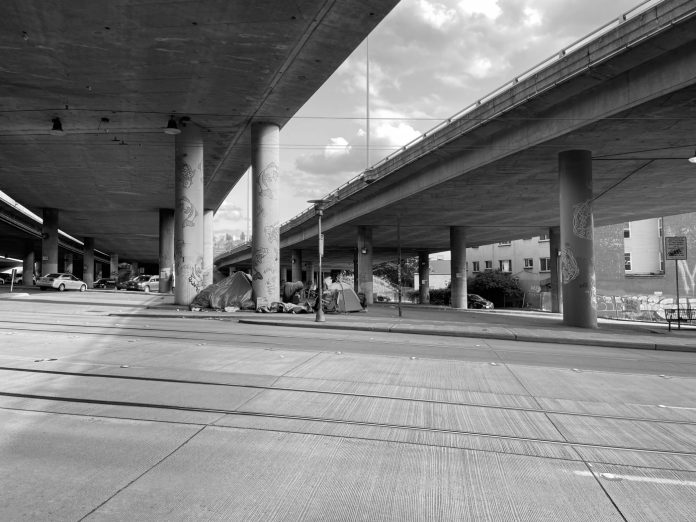
Removals of homeless encampments, often called “sweeps,” cause both economic harm and severe emotional trauma for people who are living unsheltered. Sadly, while encampment removals have been defended as a way to protect homeless people from crime and predation, the removals themselves have often violated the very civil liberties that our government officials are charged with protecting.
But that could change if a new bill before Seattle City Council is passed into law. Council Bill 119796 aims to rein in encampment cleanup procedures, and comes on the heels of a number of high profile encampment removals.
While the practice of clearing encampments has been going on for years, it has drawn increased public backlash in recent weeks due to circumstances surrounding the COVID-19 pandemic. Recent encampment removals in Ballard and Chinatown-International District were carried out despite guidance by the CDC to avoid such removals and despite Mayor Jenny Durkan’s own policy stating encampment removals would be suspended.
The proposed legislation to curb encampment cleanups is sponsored by Councilmember Tammy Morales (District 2) and would prevent the City’s Navigation Team from clearing encampments not meeting a narrow set of criteria. Chief among those criteria is a requirement that public health resources be provided to encampment residents before that encampment is removed on the grounds that it constitutes a “public health threat.”
The Mayor’s office has voiced strong opposition to the bill, signalling that it would be dead on arrival if passed. During Council’s deliberations on the bill this past Wednesday at a meeting of the Select Committee on Homelessness Strategies and Investments, Senior Deputy Mayor Mike Fong was asked by committee chair Andrew Lewis (District 7) how the bill’s language could be amended to gain the executive’s support. Fong made it clear that the Mayor’s office was unlikely to support any legislation related to encampment removals saying, “Fundamentally we simply don’t believe that this particular issue with regard to encampment removals is something that should be legislated.”
Without the Mayor’s support, Councilmember Morales’ bill is unlikely to become law. Under the rules of the current emergency proclamation, Council is unable to override a veto by the Mayor, even with a unanimous vote.
In response to the executive’s outright opposition to any legislation that would constrain their current practices, Councilmember Lewis suggested that members of City Council meet with the Mayor’s office to review the administrative rules governing encampment removals. “I want us to dive into and look at a plan or a path to having some kind of consultative conversation about the Multi-Departmental Administrative Rules that currently undergird the Navigation Team: how we can evaluate how they are working; where there’s room for improvement of those rules; and what changes we can make to improve and fix those rules along the lines of the posture that this Council had adopted in the early spring.”
The administrative rules that Councilmember Lewis is referring to are Multi-Departmental Administrative Rule 17–01 (MDAR 17–01) and Department of Finance and Administrative Services Rule 17–01 (FAS 17–01). MDAR 17–01 establishes the legal basis for prohibiting camping within the City while FAS 17–01 defines protocols that the City must follow when conducting an encampment removal.
Councilmember Lewis is right to focus attention on MDAR 17-01 and FAS 17-01 as these two documents have enabled a vast expansion of encampment removals in recent years, an expansion that has been marked by an abject failure to protect the civil rights and basic human dignity of people living unsheltered. And it’s important to stress that the deficiency of the City’s current practices is fundamentally due to the vague and permissive language of the rules and not simply poor enforcement. It is the administrative rules themselves that criminalize homelessness and fail to uphold due process rights, and they serve as an example of what happens when those who are enforcing the law — and not democratically elected representatives — get to write their own regulations.
One of the most egregious sections in the City’s administrative rules creates a loophole that exempts the City from virtually all of the regulations on encampment removals–regulations that exist in the first place to protect the rights of people experiencing homelessness. According to this loophole, if the City deems an encampment to be an “obstruction” then encampment residents can be forced to move with no advanced notice, with no offer of shelter, and with a reduced standard of care being used when storing or disposing of their personal belongings.
This provision would be problematic even if it only applied to legitimate obstructions, but the City has made the situation worse by defining the word “obstruction” vaguely and interpreting it broadly. Under Mayor Jenny Durkan the vast majority of encampment removals have been classified as “obstruction” removals, exempting them from provisions that protect the rights of encampment residents: according to the most recent Navigation Team quarterly report, “obstruction” removals accounted for 278 of the 303 encampments that were removed in Q4 of 2019.
At issue here is not whether an encampment should or should not be removed at all–it’s whether the residents of that encampment have any right to due process. An individual’s right to due process before the law is guaranteed by the United States Constitution, and a number of high profile court cases in recent years have upheld these rights for all people regardless of housing status.
A 2012 ruling by the Ninth Circuit Court of Appeals in the case of Lavan v. The City of Los Angeles concluded that: “The Fourth and Fourteenth Amendments protect homeless persons from government seizure and summary destruction of their unabandoned, but momentarily unattended, personal property.”
More recently, the Ninth Circuit Court of Appeals held in 2018 in the case of Martin v. Boise that “the Cruel and Unusual Punishments Clause of the Eighth Amendment precluded the enforcement of a statute prohibiting sleeping outside against homeless individuals with no access to alternative shelter.” And yet, in spite of this ruling the City’s administrative rules still allow the Navigation Team to clear an “obstruction” encampment with no offer of shelter.
The trauma caused by “obstruction” removals, their likely unconstitutionality, and their blatant disregard for basic civil rights should lead us to demand that such removals only be used in the most extreme of circumstances, if at all. And even then alternatives should exist to a total encampment removal. If the “obstruction” can be cleared without a complete removal of the encampment, then every effort should be made to do so.
If members of City Council and members of the executive are serious about making reforms to the encampment removal process, then they must revisit the language of the administrative rules, word by word. In revisiting these rules, our lawmakers must ensure that human lives and human rights are not just protected but enshrined.
The post is adapted and abbreviated from Anton Dekom’s medium post on the topic. Read that post for more specifics about the administrative changes needed.

Anton Dekom (Guest Contributor)
Anton is an architect at Neiman Taber Architects, a mission-based design and development firm that specializes in microhousing and multifamily residential buildings in Seattle. He is also a co-creator of Mighty House, a free, open source tiny house shelter. Anton is a member of AIA Seattle's Public Policy Board and a former co-chair of the Committee on Homelessness. He writes about homelessness on Medium (@adekom).
